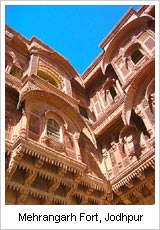Introduction:
Mehrangarh Fort, located in Jodhpur city in Rajasthan state
is one of the largest forts and a famous tourist place in
India.The Mehrangarh Museum Trust was settled in March,1972
by His Highness The Maharaja Gaj Singh II with the principal
objective of setting up a world class museum in Jodhpur. It
was intended that this museum eventually house and display
the Maharaja's substantial collections; of miniature paintings,
portraits, books and manuscripts, weapons, textiles and tents,
elephant howdahs and palanquins, and various objects' d art.
The Mehrangarh Fort encloses many palaces, which are known
for their intricate carvings and sprawling courtyards. Moti
Mahal or the Pearl Palace has a delicately carved stone screen
and treasures the Sringar Chowki, royal throne of Jodhpur.
Umaid Villas displays the Rajput miniature paintings and Ajit
Villas exhibits musical instruments and the royal costumes.
Both these villas are joined by a beautiful mirror room. Other
attractions of Mehrangarh Fort, Rajasthan include several
palaces inside the fort, with their sprawling and huge courtyards.
One of the fort's palaces, The Moti Mahal or the Pearl Palace,
has the royal throne of Jodhpur, the Sringar Chowki. The fort
also has galleries, temples, etc. To the left of the Mehrangarh
Fort is the Chhatri of a soldier, Kirat Singh Soda. It is
the spot where he fell while defending the fort against the
armies of Amber.
PHOOL MAHAL
The grandest of Mehrangarh's period rooms, the Phool Mahal
was in all likely hood a private and exclusive chamber of
pleasure dancing girls once swooned in exhaustion here under
a ceiling rich in gold filigree. The Phool Mahal was created
by Maharaja Abhaya Singh (1724-1749) and the gold came from
Ahmedabad in Gujarat as war booty after his famous victory
over the rebellious Mughal governor, Sarbuland Khan. The paintings,
royal portraits and the ever-popular raga mala, came much
later, in the reign of Jaswant Singh II.
JHANKI MAHAL
The Jhanki Mahal, from where the royal ladies watched the
official proceedings, in the courtyard, today houses a rich
collection of the royal cradles. The cradles are decorated
with gilt mirrors and figures of fairies, elephant and birds.
|
|
 |

